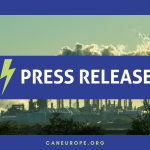Dear Minister of Foreign Affairs,
at the upcoming Foreign Affairs Council on 6 March you will discuss the interlinkage between the EU’s climate and energy diplomacy and security policy. Climate Action Network Europe welcomes the initiative as we strongly believe that Europe’s geopolitical interests are closely linked to managing climate risk and the global energy transition toward 100% renewable energy.
Climate change is already impeding European security not only through the physical damage to our environment, resources and infrastructure, but increasingly so also through the economic, societal and geopolitical impacts. Scarcity of resources, food and drinking water derived from climate change has already led to displacement of people, to social unrest and even to violent conflicts across the planet, and lately in particular in the Middle-East and in Northern Africa.
It is paramount that the broad ranging impacts of climate change and strategies to tackle them are placed at the centre of the EU’s foreign policy objectives, and that the EU’s and the Member States’ diplomacy actively works towards sustainable, fair and climate resilient zero-carbon societies. This is even more important now that the new US administration is distancing itself from science and the urgency of climate action. Building strong climate alliances with our strategic partners such as China, India, Canada and vulnerable developing countries will ensure that climate protection is placed high on the global agenda.
The Paris Climate Agreement would take us a long way to enhancing our security, provided it was fully implemented. In Paris all countries agreed to take drastic action to protect the planet from climate change, to jointly pursue efforts to limit temperature rise to 1.5°C, and to rapidly reduce emissions to zero in the second half of the century, as well as to make finance flows consistent with this pathway.
This requires all countries to:
- Revise their current inadequate 2030 climate action targets in the context of the UNFCCC facilitative dialogue in 2018-2020 to be aligned with the 1.5°C target, as agreed in Paris.
- Develop climate resilient zero-carbon and 100% renewable long term sustainable development strategies by 2018 that maintain policy coherence by integrating human rights, the Sustainable Development Goals and commitments to eradicate poverty and inequality.
- Align financial planning and investments with zero-carbon strategies, end subsidies to fossil fuel projects and infrastructure whilst also providing additional support to climate resilience and protection.
Climate change is a catalyst for conflicts. In this increasingly interconnected world Europe’s security rests on stability and wellbeing of our neighbours and the rest of the planet. We look forward to working with you towards a safer and 100% renewable energy future.
Yours Sincerely,
Wendel Trio
Director
Climate Action Network Europe



